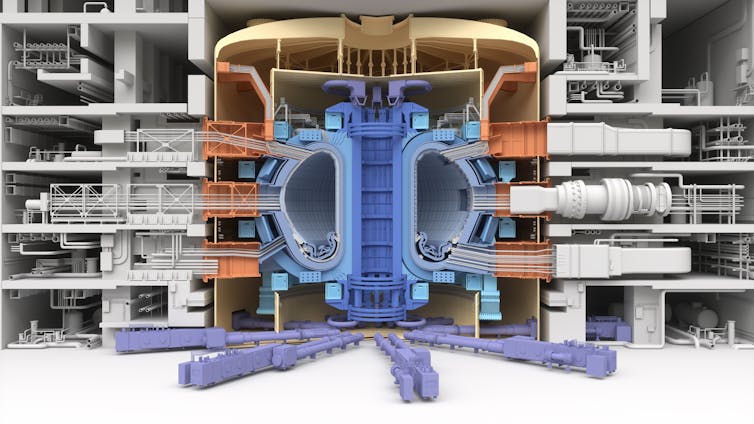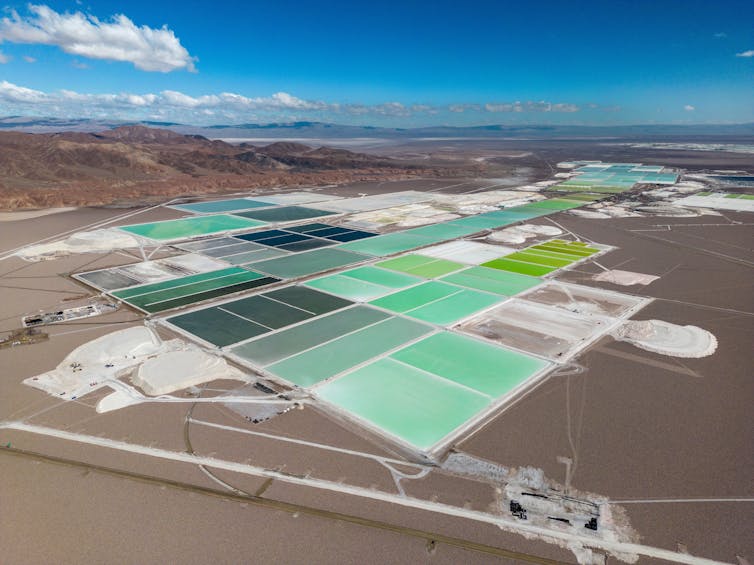
Harnessing energy from nuclear fusion – the combining of nuclei, which lie within atoms – could be instrumental in the shift towards a decarbonised global energy system. As issues of climate change and energy security are becoming increasingly salient, the promise of an apparently “clean”, “abundant” and “safe” energy source, such as fusion, is ever more appealing.
In response, the fusion industry is growing rapidly and the trope that fusion is “30 years away and always will be” is beginning to lose credibility as the technology moves beyond its experimental stage.
But it’s too easy to generate hype around a seemingly ideal solution to societal challenges – and I would argue that the realisation of fusion energy may come into tension with the issues it proposes to solve.
Contextualising this hype and exploring areas where these tensions may arise is critical to ensuring the technology develops in an ethically sound way and can provide net societal benefit if it proves viable.
The appeal of a zero-carbon, low-waste, reliable and relatively safe energy source, such as fusion, is self-evident. It is set against the background of growing global energy demand and in the context of climate change. This all necessitates a transition to a clean energy system.
It’s widely thought that fusion energy would be able to plug the gaps of existing energy sources. For example, it would circumvent the intermittency of renewables, given that the supply from solar and wind power is unpredictable, reliant as it is on weather. Fusion also avoids the long-lived radioactive waste, safety issues and public concerns around conventional nuclear fission power. It would help mitigate the carbon cost and greenhouse gas emissions from fossil fuels.

Fusion energy may also placate energy security concerns because some of its key resources are abundant. For example, the deuterium fuel used in some fusion processes can be readily derived from seawater. This would reduce reliance on imports and insulate nations against global market shocks.
But these benefits may mask deeper ethical questions around the development of the technology and some potentially detrimental impacts. Perhaps one of the clearest instances of such a tension arises over environmental sustainability. This applies particularly to the association with climate change mitigation and the reduction of greenhouse gas emissions.
Climate change is an issue that lends itself to the “techno-fix” approach – in other words, it can be tempting to avoid making important changes to our behaviour because we think we can depend on technology to fix everything. This is known as the “mitigation obstruction” argument.

Squaring greenhouse gas emissions with energy demand also raises questions of justice and equity. Energy demand is growing in certain regions, primarily the global south, that have contributed the least to the current climate crisis. Yet fusion programmes are overwhelmingly based in the global north. So if fusion proves viable, those with access to such a transformative technology are not necessarily those who will need it most.
Climate change is a global challenge, so any proposed solution must account for global impact. Efforts must be made to recognise the context of development and incorporate considerations of global inequity in the deployment of fusion if we are to meet the climate challenge.
Similar concerns can be found in the materials used for fusion energy. These include critical minerals, including lithium, tungsten and cobalt. Extraction and processing of these minerals emits greenhouse gases. In some cases, extraction operations are located on or near the lands of indigenous peoples. And the supply chains for these materials are embedded in geopolitical tensions, with alliances, collaboration, competition and the potential for monopolies forming.

Mercury, for example, is used in the processing of lithium for fusion reactors. Not only is the element environmentally damaging and toxic but depends largely on Chinese production.
The accelerating pace of fusion energy increases the risk of overlooking these potential hazards along the way. However, I would say this is not a case where we need to apply moral brakes, but rather shift gear. Approaching these potential ethical tensions requires systematic thought throughout the development process, from thinking about the implications of design decisions and materials choices, through to equitable deployment strategies and knowledge sharing.
Energy access underpins human wellbeing and development and the energy system as a whole has deep societal impacts. Failure to openly engage with the social and ethical challenges of new and emerging technologies in this space would be irresponsible at best, and harmful at worst. This is particularly so when impacts of fusion technology may compound the precise challenges it aims to solve.![]()
Sophie Cogan, PhD Candidate, University of York
This article is republished from The Conversation under a Creative Commons license. Read the original article.
15 Comments
not ignoring the fact we will be creating tiny stars all over earth, surely there's a risk in that?
Fusion is far safer than fission, because fission can have runaway chain reactions... Fusion on the other hand requires far more difficult to maintain circumstances to occur. With fission, something goes wrong you risk a meltdown and chain reaction, with fusion, anything goes wrong and you simply lose the requirements for fusion to occur.
In otherwords, maintaining the properties that occur on the sun is extremely difficult.
Fission basically just has a PR problem at this point. It’s one of the safest sources of energy.
It's also one of the most expensive
Are you volunteering to go in and sort out Fukushima?
Fusion Foolery | Do the Math (ucsd.edu)
Let’s wave a magic wand for a minute and say that the 400 MJ input produced a 700 MJ output for a net of 300 MJ: 100 times the recent breakthrough. This accords with the ten shots per second mentioned above. What is the price of the delivered electricity? After thermodynamic inefficiency is accounted, we get 100 MJ out for $100,000 cost, or $1,000 per megajoule. We are accustomed to using the kilowatt-hour (kWh) as a measure of delivered energy, which is 3.6 MJ. The cost becomes, then, $3,600 per kWh. Typical electricity costs are in the neighborhood of $0.15–0.20 per kWh, so we’re dealing with a cost that is 20,000 times higher than nominal. And don’t forget, we used a magic wand to even get there. It’s closer to 2 million times more expensive currently, and as a net energy loser to boot.
Murphy is always on the money.
I have a friend who's PhD was into fusion. In the mid-70's. He's retired now, and reckons we'll never get there - it's just an excuse to peddle on...
Whilst I agree Fusion isn't an excuse to peddle on, Machine Learning, HEDP and HT Superconductor research are still in their infancy, so I'm not sure any physicist has the data to say anything other than reckons at "this" stage.
I despise this mindset. Energy = higher living standards. F*** mitigation. We should be using far more of it.
Degrowthers need to be removed from polite society. It’s a death cult.
Despising goes with having to steal pen-names - psychological help required.
It's not a matter of despising, it's a matter of math.
That Physics PhD friend and I discuss this at length - pragmatically.
You had ancestors who filed obediently into churches - I can tell. Needed to believe, they probably did. Genes, eh?
Should and can are mutually exclusive. And get yourself your own name. And do some learning.
puk,
I couldn't care less what name you use here. What I want to ask you is whether or not you see any limits to growth. Do you believe that we can simply keep on using fossil fuels and indeed accelerate their use as you appear to suggest? Do you think we will just keep on finding new oil and gas fields? Is climate change something we should be concerned with or not?
There are always Limits to Growth within a Bounded System. The trick is to try and anticipate them, rather than wait until you hit them.
Fossil fuels? Think of a bell-curve. That is your total resource - the stock. Start chewing into it, per time, from the left. It fits exponential growth - for a while. Then the bell-curve wants to fall away, trending over the top. You can, of course, push on upward, and we have attempted to do that. But the area (filling the space between the bell-curve and our more-upward trajectory) has to come from somewhere. That somewhere, is the right-hand end of the bell-curve, obviously. So the drop-off gets ever-steeper; ultimately vertical. This is non-linear, few will have time to react smoothly.
No, discoveries peaked in 1964.
Yes Climate Change is real. I used to think of it as a background drum-beat to financial collapse/war - but it seems to be happening faster, and may be more significant than I thought (weather events could conceivably wipe whole economies).
Where is all this energy and the resources to produce going to come from? How are you going to deal with the externalities - the BAU approach of just ignore them and hope for the best?
lol - projection much. Go and "grow" a bacteria in a petri dish and see how far it gets. Even with an abundance of food and energy, a bacteria's ability to access them is not too far from our own.
what a wooly minded juck article. fusion is still a pipe dream but for these people if it's not solar wind or buses there are issues.

We welcome your comments below. If you are not already registered, please register to comment
Remember we welcome robust, respectful and insightful debate. We don't welcome abusive or defamatory comments and will de-register those repeatedly making such comments. Our current comment policy is here.